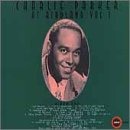| All Artists: Charlie Parker Title: Birdland 1 Members Wishing: 0 Total Copies: 0 Label: Ember Original Release Date: 5/16/2000 Release Date: 5/16/2000 Album Type: Original recording remastered, Import, Live Genres: Blues, Jazz, Pop Styles: Swing Jazz, Bebop Number of Discs: 2 SwapaCD Credits: 2 UPCs: 658028170221, 0658028170221 |
Search - Charlie Parker :: Birdland 1
 | Charlie Parker Birdland 1 Genres: Blues, Jazz, Pop
|
Larger Image |
CD DetailsSimilar CDs |
CD ReviewsBird, Bud, Fats, Curly, Blakey, Birdland '50 or '51 CrimeFictionBuff | Brooklyn | 09/10/2005 (5 out of 5 stars) "This has claim to being the greatest recorded Bebop. Bud Powell is an inferno here. This is a cheap edition with some glitches, but the music is there. A must." Great music, poor presentation John Grabowski | USA | 09/18/2008 (4 out of 5 stars) "This is one of the seminal bop recordings. Simply put, it doesn't get better than this. Too bad the poorly-edited version here seems to be the only way to get at these performances right now. There's much debate about these live recordings. The identity of the trumpeter is in dispute: the records, whatever they are, are said to indicate Fats Navarro, and to my ears that sounds right. But Fats was about two weeks from death if we accept the official recording date of June 1950, and was reportedly in extremely poor health by then. Some discographies thus move the date back to 1949 and the location to the Royal Roost. But this becomes impossible for other logistical reasons. This release claims the recording dates are May of 1950--would Navarro have been well enough to sound that good even then? The short on it is there's no date and no location and no personnel that satisfies any one theory about when and where these sizzling performances came. There's even disagreement about the drummer (Roy Haynes? Art Blakey?). The only other fact agreed on is the smoking piano player is Bud Powell, who is never short of amazing.
In the days of vinyl, Columbia released much of what's on here under the title "One Night At Birdland." That remastering, poor as it was, was better than this CD. As the reviewer CrimeFictionBuff below me notes, the music has skips in spots, skips that were not present on the Columbia version. As for the sound quality, it was about as bad on that earlier release, though even here I recall a warmer presence and more bass on at least some of the numbers. But poor sound is what you have to put up with when listening to many Bird recordings made my enthusiastic amateurs in clubs, so Parker aficionados generally should be used to this caliber of sound. What's inexcusable is a bizarre mastering glitch in the middle of the second version of Wahoo (based on Perdido). In the middle of Bud's solo, we start to hear the ending where Bird and Fats (or whoever is on trumpet) are trading fours, superimposed. In other words, we're listening to two parts of the recording simultaneously. The drumming, already busy, becomes a real mess at this point, and the whole thing turns unlistenable. This error was not on the Columbia release, nor have I ever heard it on anthology albums that excerpt this recording, so the blame has to lie at the feet of this label, Ember, which I've never heard of before. Other strange glitches include the fact that the coda is cut off of Round Midnight--again, this isn't so in the Columbia vinyl version. Also, a rather amusing performance of Embraceable You included in the Columbia set has been omitted here. It features a stunning Bird solo and a vocal by a woman (whose name escapes me) who is drunk as Ted Turner at a Christmas party and terribly out of tune. The music that is included here is amazing, and that is why, despite all these production issues, I'm giving this release four stars. Actually the album itself gets about two stars while the musical value would rate an infinite number of stars. Bud Powell was never more inspired (and considering his consistently high level of playing, this is quite a compliment), Bird simply soars with passion, rarely falling back on a stock phrase or cliche, and the trumpeter, whoever he is, is the best horn partner Bird ever had outside of Dizzy. The atmosphere throughout is electric--one can understand with club playing like this how Bebop took the world by storm while simultaneously puzzling and shocking the older generations. Most of all, though, the band here is tight and cohesive--they're really listening to each other, unlike the quintet in the more famous and better-known Jazz At Massey Hall album, where I feel the soloists just let loose with long strings of not-very-inspired playing. This and not that album represent the apex of Bird in the live quintet setting. One wonders, though, why there aren't other, better issues of this material. Does Columbia still own the recordings from the vinyl version? If so, can a Phil Schapp-type person restore them? I have a feeling the masters have decayed and poor quality bootlegs may be all that remain--sad indeed. So this is worth owning, but at the same time, here's hoping a better release someday comes along, if that's possible." |

 Track Listings (20) - Disc #1
Track Listings (20) - Disc #1